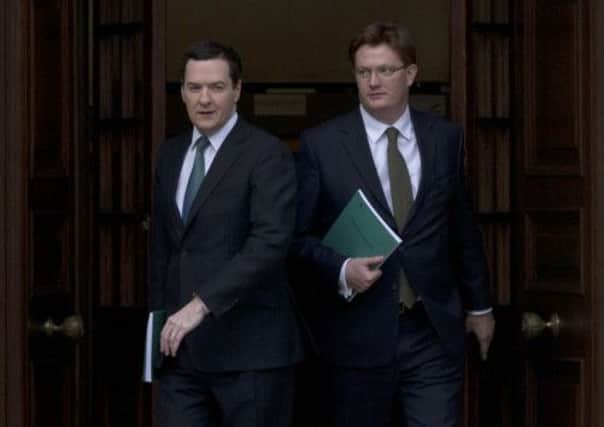Leaders: By George it was a good day


Britain is now growing faster than every other major industrial economy, including America. The independent Office for Budget Responsibility (OBR) has doubled the forecast for growth it made last March. With growth comes swelling tax revenues, allowing George Osborne to borrow less and spend a little more.
The Chancellor used this newfound fiscal leeway in scattergun fashion. Businesses in England got help with rates and consumers got help with their energy and petrol bills. There was innovation – the decision to abolish employers’ national insurance for the under-21s is a welcome move. Ed Balls, replying for Labour, could hardly make himself heard for the cheers of the Tory backbenches.
Advertisement
Hide AdAdvertisement
Hide AdBut the truth is the Chancellor can take little credit for the improvement. The upsurge in growth Britain has been enjoying since the spring is the result of a modest spending boom funded by consumers drawing down savings or borrowing more. True, some of that increased consumer confidence is the result of Mr Osborne pumping state subsidies into the mortgage market. But no matter how you cut it, this upturn is hardly sustainable. Worse, as shown in the fine print of yesterday’s Autumn Statement, Britain’s industrial investment is down, exports are languishing, and productivity has nose-dived. There is scant evidence of any improvement in Britain’s underlying economic efficiency, despite five years of austerity.
Because the real economy is not improving, Britain’s national finances remain in dire straits. This explains why the Chancellor intends to press on with his austerity programme after the 2015 general election. He plans an absolute cap on welfare spending and proposes to advance the raising of the state pension age by fully a decade. Mr Osborne should beware how these proposals impact on the referendum debate north of the Border. In particular, changes to the pension age will have a disproportionate impact in Scotland given our shorter life expectancy.
The OBR’s strangely pessimistic estimates for North Sea oil revenues could also become a referendum football. These numbers were contradicted by the industry trade association, Oil & Gas UK, which predicts an upturn in production in 2015. Not that Alex Salmond can grandstand. The Autumn Statement offered important help for small firms, including further reduction of the rates burden. The Scottish Government would do well to pass on that help and not use any Barnett consequentials to manufacture political give-aways during the referendum campaign.
The full details of the Autumn Statement remain to be digested over the next few days. Mr Osborne had a good day yesterday but the jury is still out on his Autumn Statement.
Marine should not have been named
YESTERDAY, three High Court judges lifted the anonymity of the Royal Marine found guilty of murdering a seriously wounded Taleban prisoner – the first British soldier to be found guilty of murder on the battlefield since the second World War. It is a cardinal principal of British justice that such justice should be seen to be done. But in this case the marine’s lawyers argued – with reason – that both he and his family could become targets for vengeful extremists. The judges were wrong and the marine’s lawyers were correct.
For proof, we have only to look at another trial taking place yesterday – that of two men accused of murdering Fusilier Lee Rigby. The jury heard the statement of one of the accused, Michael Adebolajo, stating how he deliberately drove a car into the soldier at 40mph, before attempting to decapitate him with a meat cleaver.
Adebolajo explained that Fusilier Rigby was a “fair target” because a soldier is “someone who joins the army with kind of an understanding that your life is at risk” – even if he is a random individual who just happened to be walking down a street at the wrong time. However the jury decides in his case, Adebolajo is wrong that any soldier is fair game for beheading just because they “know the risks”.
The law needs to balance open justice with protecting the citizen. As long as there are those who feel it is acceptable to kill people for political or religious grounds and society is aware of such people, than the law needs to protect potential targets. Any thought of naming the other Royal Marines involved in the case of the murdered Taleban prisoner should be rejected outright as speedily as possible.